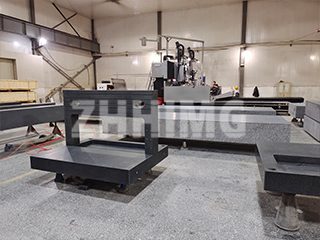The granite square is a crucial tool for measuring flatness and perpendicularity in industrial inspections. It is widely used in precision measurement for instruments, machinery components, and high-accuracy calibration. Granite measuring tools, including the granite square, are foundational tools in industrial quality control and mechanical testing.
Material Composition of Granite Squares
Granite squares are primarily made from granite with key minerals including pyroxene, plagioclase, small amounts of olivine, biotite, and trace magnetite. This composition results in a dark-colored stone with a fine structure. The granite’s uniform texture and high stability come from billions of years of natural aging, which contributes to its exceptional strength and hardness. These properties make it ideal for use in both industrial production and laboratory measurement environments, where precision is critical.
The granite square is engineered to offer high precision and excellent dimensional stability even under heavy loads, ensuring the accuracy of measurements over time.
Applications of Granite Squares
Granite squares are primarily used to check the flatness and perpendicularity of parts, which are essential for mechanical testing, precision alignment, and calibration of machines and instruments. These squares are ideal for verifying right angles and the parallelism of machine parts, making them indispensable for high-precision measurements in machining and quality assurance.
Key Features & Advantages of Granite Squares
-
Uniformity & Stability – The natural aging process results in a granite material that has a consistent structure, minimal thermal expansion, and no internal stress, ensuring that it retains its precision and shape under varying conditions.
-
High Rigidity & Hardness – Granite’s exceptional rigidity and abrasion resistance make the square highly durable and resistant to wear.
-
Corrosion Resistance – Granite squares are impervious to acids and alkalis, will not rust, and require no oiling. They are also less likely to attract dust or other contaminants, making them low-maintenance and easy to clean.
-
Scratch Resistance – The surface of granite squares is resistant to scratching, and they maintain accuracy even in non-constant temperatures, as they are unaffected by environmental fluctuations.
-
Non-Magnetic – Granite squares are non-magnetic, ensuring smooth, friction-free movement during measurement and no interference from magnetic fields or moisture, ensuring consistent performance in precision work.
Why Choose Granite Squares for Your Measurement Needs?
-
Long-lasting precision – Granite squares provide consistent accuracy and stability, making them suitable for long-term use in high-precision applications.
-
Resistance to wear and environmental factors – Their resistance to scratches, corrosion, and wear ensures that granite squares maintain high-precision standards even in demanding environments.
-
Ease of maintenance – Unlike metal alternatives, granite squares require minimal maintenance and are resistant to rust and corrosion.
-
Wide application – Ideal for a range of industrial uses, from machine calibration to mechanical component testing.
Applications
Granite squares are essential for:
-
Precision measurement and inspection
-
Tool calibration and alignment
-
Mechanical and CNC machine setup
-
Metrology labs
-
Component testing and verification
Granite squares are invaluable tools for professionals in precision engineering, manufacturing, and quality control. Their high durability, accuracy, and resistance to wear make them a preferred choice in industries where precision and reliability are paramount.
Post time: Aug-14-2025

